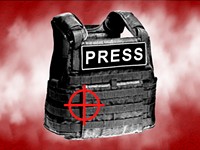[
{
"name": "500x250 Ad",
"insertPoint": "5",
"component": "15667920",
"parentWrapperClass": "",
"requiredCountToDisplay": "1"
}
]
"Are you worried?" a friend asked the other day. You bet I am. We're nine weeks away from the presidential election, and Kerry and Bush are still in a virtual tie in the polls. Bush continues to swat away the bad news as if it's no more concern than a mosquito. And Kerry can't seem to do anything right.
I keep reaching for a reason to be optimistic --- not just about Kerry's chances, but about Kerry himself. And Kerry keeps slipping out of my grasp. He has said that he voted to give Bush the authority to invade Iraq because he believed what Bush said about Iraq's weapons of mass destruction. Now that he knows that information was wrong, would he still vote for the war? Incredibly, he says he would.
Then what's the difference between Kerry and Bush? If the two agree on one of the crucial issues of this campaign, why should anybody care who is elected in November?
There are plenty of reasons to care, of course. Iraq is simply one issue, albeit it a huge one. There's the Supreme Court. And environmental protection. Abortion rights. Gay rights. Health care. Education. Wealth disparity. And the presidency being in thrall to corporate interests. I'm still as concerned about Bush as I ever have been.
But man, am I discouraged. Maybe in his heart, Kerry is sorry he voted for the war. Maybe this late in the campaign, he's scared to fess up. But I'll take him at his word: he means what he said. We should have gone to war --- but we should have been better prepared. And that's just terrible. Terrible.
Yes, on those rare occasions when we must go to war, we should be far better prepared than we were with Iraq. But we should not have gone to war in Iraq in the first place. And if we had been better prepared, what then? We should have done whatever it took? Slaughtered as many people as necessary to beat the country into submission?
Equally appalling, of course, are the Bush campaign's tactics --- and, so far, equally appalling is the public reaction.
"One of the wonders of recent American politics," Paul Krugman noted in the Times last week, "has been the ability of Mr. Bush and his supporters to wrap their partisanship in the flag. Through innuendo and direct attacks by surrogates, men who assiduously avoided service in Vietnam, like Dick Cheney (five deferments), John Ashcroft (seven deferments), and George Bush (a comfy spot in the National Guard, and a mysterious gap in his records), have questioned the patriotism of men who risked their lives and suffered for their country: John McCain, Max Cleland, and now John Kerry."
(Patriotic Cheney, questioned about avoiding the military, says glibly that he had "other priorities in the '60s than military service.")
And yet the attacks continue, with Bob Dole jumping onto the garbage heap last week. And, this week, Bush Senior. And when the president is asked to denounce the ads trashing Kerry's service, he smirks and says he denounces all ads from "527's," the independent activist groups running attack ads. He still has not repudiated the ads about Kerry's service.
And what's been the public's reaction to this smearing of veterans? Other than from Kerry supporters, no outrage.
For the war itself, there's plenty of blame to go around. It's been obvious to many of us that the Bush administration intended to go after Saddam Hussein right from the beginning. Congress simply got out of the way. But a lot of the mainstream news media was complicit. Journalists became too cozy with, too trusting of, war advocates.
There had been plenty of dissent about the Bush drive toward war, and plenty of warnings that the WMD reports on which the war was founded were shaky. The dissent came from millions of people around the world, citizens and government leaders. The warnings came from UN inspectors, from former military officers, even from people in the Pentagon. But the mainstream media dismissed or downplayed them.
Both the Times and the Washington Post have published articles admitting that their pre-war coverage was deeply flawed. They have admitted that they were not skeptical enough, that they did not challenge pro-war sources, that they played up the pro-war stuff, featuring it on their front pages and burying articles by more skeptical reporters deep back in their news sections.
In his comments to Post media critic Howard Kurtz, who wrote the analysis of his newspaper's pre-war coverage, executive editor Leonard Downie seemed contrite. But he revealed a major flaw in the attitude of mainstream journalism: there are "credible" sources, and there are others. The Establishment, to use a grand old '60s phrase, is credible until proven otherwise. Everybody else is viewed cynically.
"The voices raising questions about the war were lonely ones," Downie told Kurtz. "We didn't pay enough attention to the minority."
The minority.
Shot back one Post reader: "On February 15, 2003, I was one of several million people worldwide protesting the imminent invasion of Iraq. We were hundreds of thousands strong in New York City alone. While I experienced many powerful emotions that day, I can assure Mr. Downie that 'loneliness' was not among them."
Writing in American Journalism Review about the coverage of the Bush rush to war, AJR editor Rem Rieder speaks disparagingly of "the media's uncharacteristic lack of skepticism."
The media. The US mainstream media lacked skepticism (and sadly, that has become increasingly characteristic). But many in the foreign media were very skeptical. And in the US, the alternative media were skeptical: national magazines like The Nation and The American Prospect, newsweeklies like this one. We saw the signs early on, back in the first days of the Bush administration. We saw the warnings in his 2002 State of the Union speech and in his June 2002 statement at West Point, when he outlined his policy of pre-emption.
All of the information was there. The mainstream media reported some of it at the time. What they did not do, as Bush began to openly press for war, was remember it, connect the dots, note that Bush had been dropping hints all along.
What they did not do was pay attention to information such as that cited by one of our letter-writers this week: Bush administration officials were talking about getting rid of Saddam before Bush was elected. Before 9/11.
Washington Post executive editor Leonard Downie says critics of the pre-war coverage "have the mistaken impression that somehow if the media's coverage had been different, there wouldn't have been a war."
Maybe not --- though the mainstream media's lapdog approach certainly made it easier for the president to get what he wanted. It may have made it harder for anti-war protesters to get support, made it harder for US senators --- including the one now running for president --- to question the administration's actions.
The mainstream media's coverage contributed to a steam-roller effect.
And now we're well into a troubling campaign in a troubling time. Voters desperately need the best coverage and analysis --- and scrutiny --- the media can provide. The mainstream media failed seriously in their pre-war coverage. The danger is that they will do so again in these last few weeks before the presidential election.
Speaking of...
-

ART | ‘Trust, but verify’
Sep 4, 2020 -

Police and press clashes rise as 'enemy of the people' label seeps in
Jun 3, 2020 -

Happy 200th birthday to the woman who dared
Feb 15, 2020 - More »
Latest in Columns
More by Mary Anna Towler
-

Police reform: advocates on what should come next
Oct 22, 2019 -

Court clears the way for Police Accountability referendum
Oct 17, 2019 -

Dade outlines initial actions on district deficit
Oct 9, 2019 - More »





